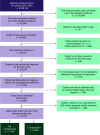Impact of surgical complications on hospital costs and revenues: retrospective database study of Medicare claims
- PMID: 37350467
- PMCID: PMC10508298
- DOI: 10.57264/cer-2023-0080
Impact of surgical complications on hospital costs and revenues: retrospective database study of Medicare claims
Abstract
Aim: To compare the length of stay, hospital costs and hospital revenues for Medicare patients with and without a subset of potentially preventable postoperative complications after major noncardiac surgery. Materials & methods: Retrospective data analysis using the Medicare Standard Analytical Files, Limited Data Set, 5% inpatient claims files for years 2016-2020. Results: In 74,103 claims selected for analysis, 71,467 claims had no complications and 2636 had one or more complications of interest. Claims with complications had significantly longer length of hospital stay (12.41 vs 3.95 days, p < 0.01), increased payments to the provider ($34,664 vs $16,641, p < 0.01) and substantially higher estimates of provider cost ($39,357 vs $16,158, p < 0.01) compared with claims without complications. This results on average in a negative difference between payments and costs for patients with complications compared with a positive difference for claims without complications (-$4693 vs $483, p < 0.01). Results were consistent across three different cost estimation methods used in the study. Conclusion: Compared with patients without postoperative complications, patients developing complications stay longer in the hospital and incur increased costs that outpace the increase in received payments. Complications are therefore costly to providers and payers, may negatively impact hospital profitability, and decrease the quality of life of patients. Quality initiatives aimed at reducing complications can be immensely valuable for both improving patient outcomes and hospital finances.
Keywords: health economics; hospital finances; postoperative complications; retrospective studies; surgical quality.
Conflict of interest statement
The authors have no other relevant affiliations or financial involvement with any organization or entity with a financial interest in or financial conflict with the subject matter or materials discussed in the manuscript apart from those disclosed.
Figures
References
-
- Patel AS, Bergman A, Moore BW, Haglund U. The economic burden of complications occurring in major surgical procedures: a systematic review. Appl. Health Econ. Health Policy 11(6), 577–592 (2013). - PubMed
-
• This systematic review of 38 studies involving major surgeries demonstrates the important economic burden that complications have on healthcare providers. The authors note the considerable heterogeneity between studies with regards to patient populations, outcomes, procedures, and the need for accurate reporting of costs and resource usage to inform hospital decision-making.
-
- de la Plaza Llamas R, Hidalgo Vega Á, Latorre Fragua RA et al. The cost of postoperative complications and economic validation of the Comprehensive Complication Index: prospective study. Ann. Surg. 273(1), 112 (2021). - PubMed
-
• Provides validation of the Comprehensive Complication Index, which shows strong association with postoperative costs, but also highlights important measures and best practices that could be used by researchers to reduce bias with regards to the handling of complications and costs in these types of studies.
Publication types
MeSH terms
LinkOut - more resources
Full Text Sources
Medical

